Report on the Deterioration of Care at Stafford Hospital
VerifiedAdded on 2022/08/09
|14
|3192
|25
Report
AI Summary
This report examines the significant decline in care standards at Stafford Hospital under the NHS, focusing on the period when patient care deteriorated. The study identifies key factors contributing to this decline, including shortages of healthcare staff, low wages, and lack of empathy among staff, as well as non-compliance with NMC standards and budget constraints. These issues led to adverse patient outcomes, including fatalities and treatment dropouts. The report analyzes the impact of unethical behavior on the hospital's reputation, public confidence, medical staff, and the NHS. Recommendations include a comprehensive restoration plan addressing revised staff pay, recruitment based on competency standards, and ample training facilities. The report emphasizes the need for ethical healthcare decisions and adherence to the four doctrines of healthcare ethics to improve patient care and restore the hospital's operational integrity. The report concludes by stressing the importance of addressing these issues to ensure the hospital can operate effectively and provide adequate patient care.
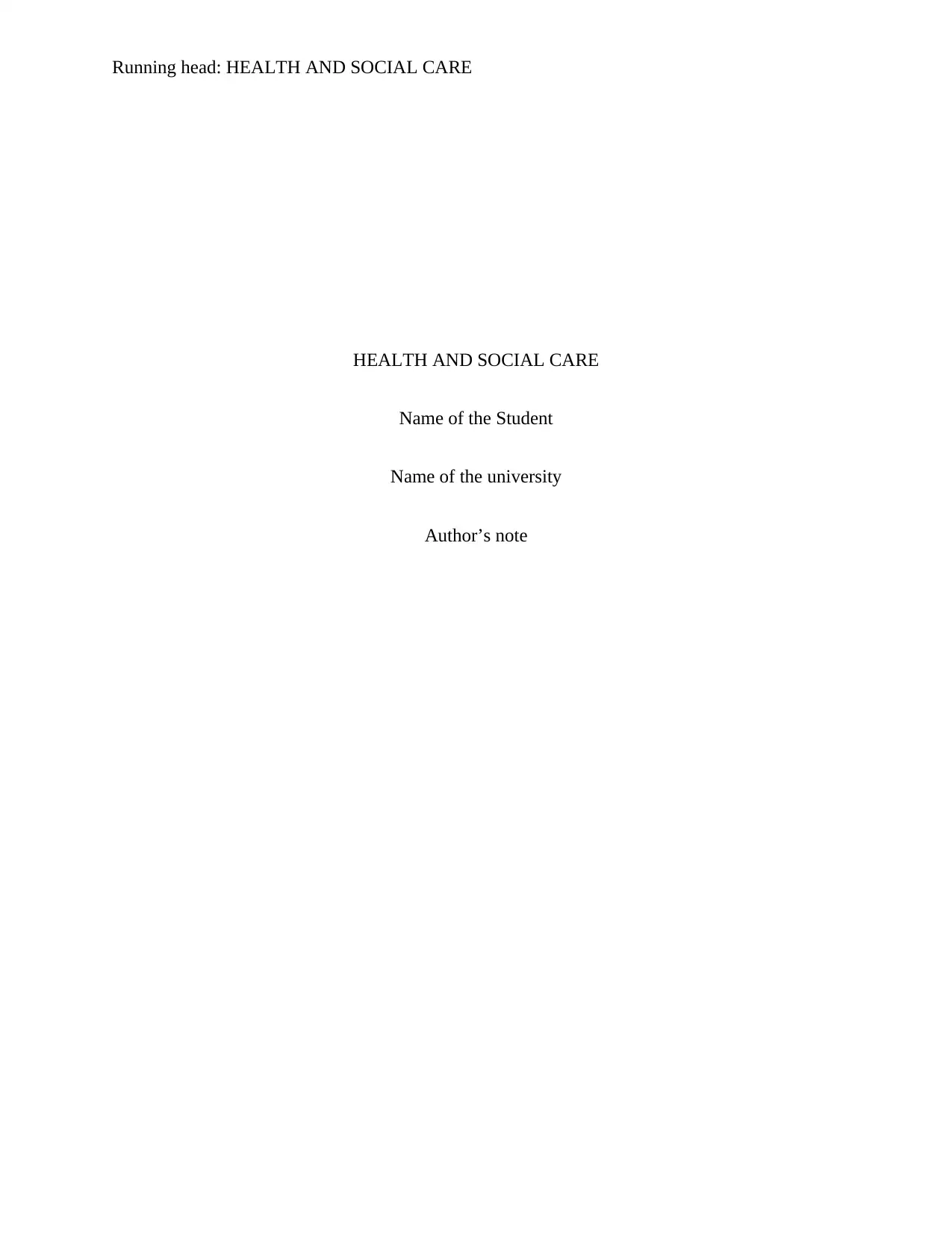
Running head: HEALTH AND SOCIAL CARE
HEALTH AND SOCIAL CARE
Name of the Student
Name of the university
Author’s note
HEALTH AND SOCIAL CARE
Name of the Student
Name of the university
Author’s note
Paraphrase This Document
Need a fresh take? Get an instant paraphrase of this document with our AI Paraphraser
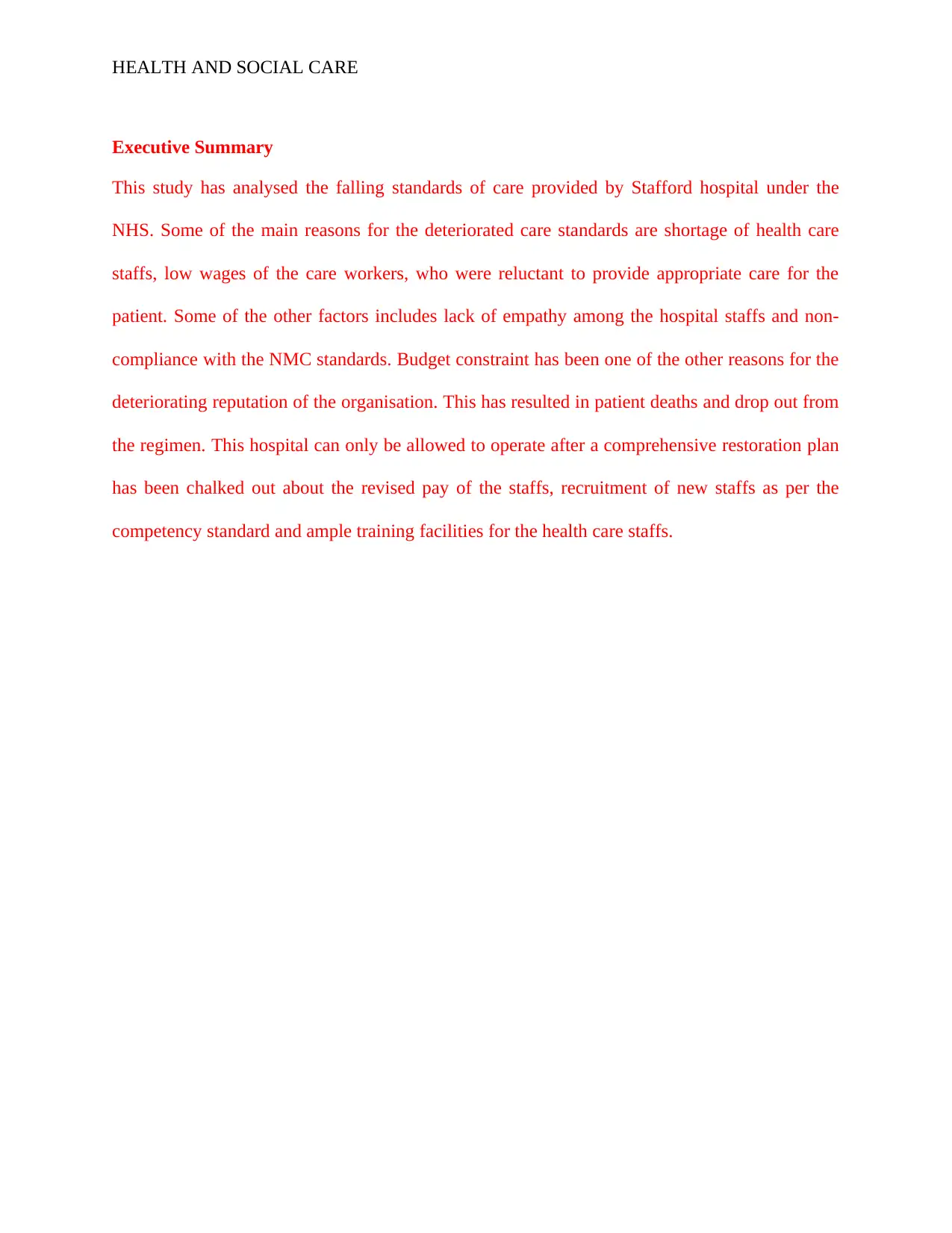
HEALTH AND SOCIAL CARE
Executive Summary
This study has analysed the falling standards of care provided by Stafford hospital under the
NHS. Some of the main reasons for the deteriorated care standards are shortage of health care
staffs, low wages of the care workers, who were reluctant to provide appropriate care for the
patient. Some of the other factors includes lack of empathy among the hospital staffs and non-
compliance with the NMC standards. Budget constraint has been one of the other reasons for the
deteriorating reputation of the organisation. This has resulted in patient deaths and drop out from
the regimen. This hospital can only be allowed to operate after a comprehensive restoration plan
has been chalked out about the revised pay of the staffs, recruitment of new staffs as per the
competency standard and ample training facilities for the health care staffs.
Executive Summary
This study has analysed the falling standards of care provided by Stafford hospital under the
NHS. Some of the main reasons for the deteriorated care standards are shortage of health care
staffs, low wages of the care workers, who were reluctant to provide appropriate care for the
patient. Some of the other factors includes lack of empathy among the hospital staffs and non-
compliance with the NMC standards. Budget constraint has been one of the other reasons for the
deteriorating reputation of the organisation. This has resulted in patient deaths and drop out from
the regimen. This hospital can only be allowed to operate after a comprehensive restoration plan
has been chalked out about the revised pay of the staffs, recruitment of new staffs as per the
competency standard and ample training facilities for the health care staffs.
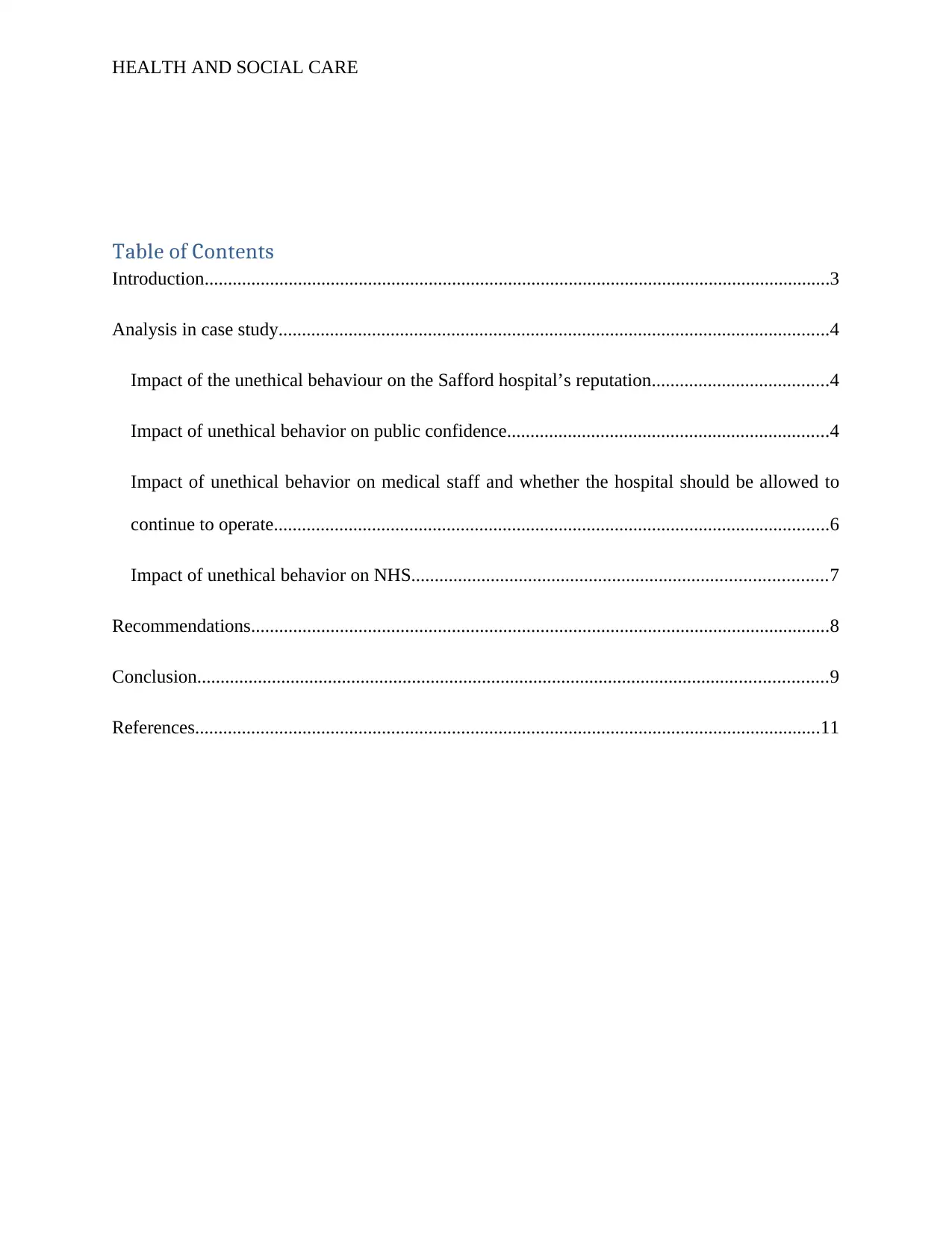
HEALTH AND SOCIAL CARE
Table of Contents
Introduction......................................................................................................................................3
Analysis in case study......................................................................................................................4
Impact of the unethical behaviour on the Safford hospital’s reputation......................................4
Impact of unethical behavior on public confidence.....................................................................4
Impact of unethical behavior on medical staff and whether the hospital should be allowed to
continue to operate.......................................................................................................................6
Impact of unethical behavior on NHS.........................................................................................7
Recommendations............................................................................................................................8
Conclusion.......................................................................................................................................9
References......................................................................................................................................11
Table of Contents
Introduction......................................................................................................................................3
Analysis in case study......................................................................................................................4
Impact of the unethical behaviour on the Safford hospital’s reputation......................................4
Impact of unethical behavior on public confidence.....................................................................4
Impact of unethical behavior on medical staff and whether the hospital should be allowed to
continue to operate.......................................................................................................................6
Impact of unethical behavior on NHS.........................................................................................7
Recommendations............................................................................................................................8
Conclusion.......................................................................................................................................9
References......................................................................................................................................11
⊘ This is a preview!⊘
Do you want full access?
Subscribe today to unlock all pages.

Trusted by 1+ million students worldwide
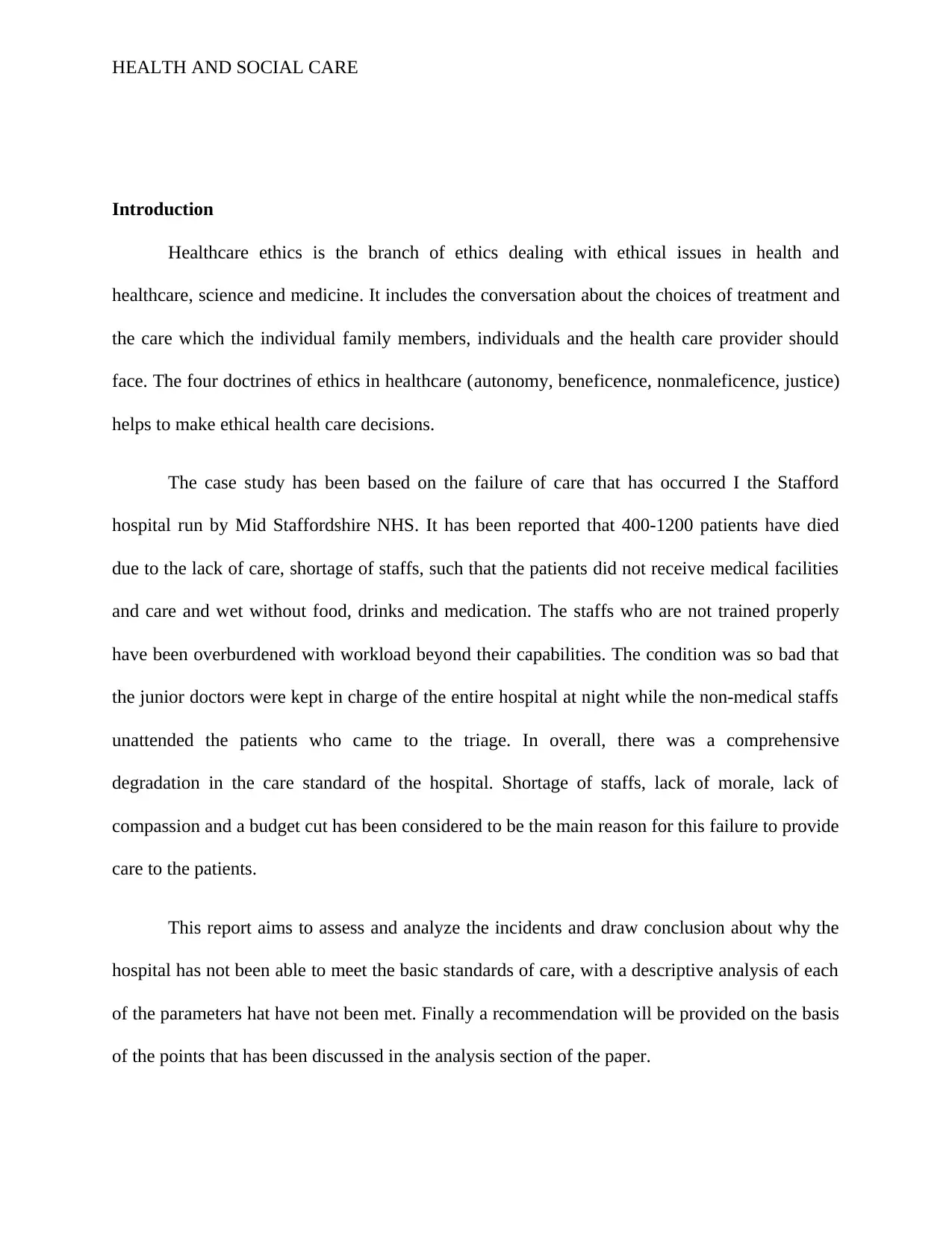
HEALTH AND SOCIAL CARE
Introduction
Healthcare ethics is the branch of ethics dealing with ethical issues in health and
healthcare, science and medicine. It includes the conversation about the choices of treatment and
the care which the individual family members, individuals and the health care provider should
face. The four doctrines of ethics in healthcare (autonomy, beneficence, nonmaleficence, justice)
helps to make ethical health care decisions.
The case study has been based on the failure of care that has occurred I the Stafford
hospital run by Mid Staffordshire NHS. It has been reported that 400-1200 patients have died
due to the lack of care, shortage of staffs, such that the patients did not receive medical facilities
and care and wet without food, drinks and medication. The staffs who are not trained properly
have been overburdened with workload beyond their capabilities. The condition was so bad that
the junior doctors were kept in charge of the entire hospital at night while the non-medical staffs
unattended the patients who came to the triage. In overall, there was a comprehensive
degradation in the care standard of the hospital. Shortage of staffs, lack of morale, lack of
compassion and a budget cut has been considered to be the main reason for this failure to provide
care to the patients.
This report aims to assess and analyze the incidents and draw conclusion about why the
hospital has not been able to meet the basic standards of care, with a descriptive analysis of each
of the parameters hat have not been met. Finally a recommendation will be provided on the basis
of the points that has been discussed in the analysis section of the paper.
Introduction
Healthcare ethics is the branch of ethics dealing with ethical issues in health and
healthcare, science and medicine. It includes the conversation about the choices of treatment and
the care which the individual family members, individuals and the health care provider should
face. The four doctrines of ethics in healthcare (autonomy, beneficence, nonmaleficence, justice)
helps to make ethical health care decisions.
The case study has been based on the failure of care that has occurred I the Stafford
hospital run by Mid Staffordshire NHS. It has been reported that 400-1200 patients have died
due to the lack of care, shortage of staffs, such that the patients did not receive medical facilities
and care and wet without food, drinks and medication. The staffs who are not trained properly
have been overburdened with workload beyond their capabilities. The condition was so bad that
the junior doctors were kept in charge of the entire hospital at night while the non-medical staffs
unattended the patients who came to the triage. In overall, there was a comprehensive
degradation in the care standard of the hospital. Shortage of staffs, lack of morale, lack of
compassion and a budget cut has been considered to be the main reason for this failure to provide
care to the patients.
This report aims to assess and analyze the incidents and draw conclusion about why the
hospital has not been able to meet the basic standards of care, with a descriptive analysis of each
of the parameters hat have not been met. Finally a recommendation will be provided on the basis
of the points that has been discussed in the analysis section of the paper.
Paraphrase This Document
Need a fresh take? Get an instant paraphrase of this document with our AI Paraphraser
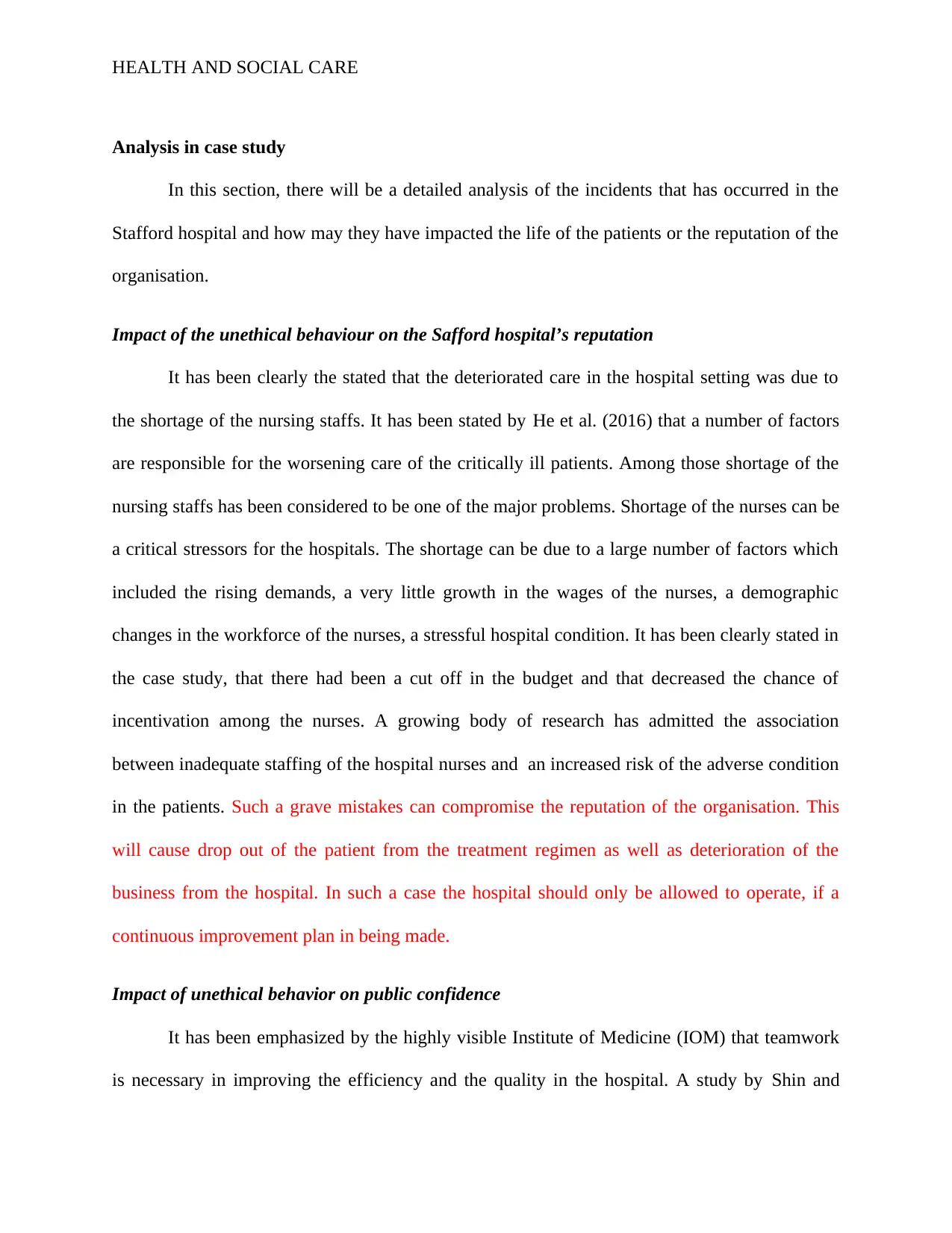
HEALTH AND SOCIAL CARE
Analysis in case study
In this section, there will be a detailed analysis of the incidents that has occurred in the
Stafford hospital and how may they have impacted the life of the patients or the reputation of the
organisation.
Impact of the unethical behaviour on the Safford hospital’s reputation
It has been clearly the stated that the deteriorated care in the hospital setting was due to
the shortage of the nursing staffs. It has been stated by He et al. (2016) that a number of factors
are responsible for the worsening care of the critically ill patients. Among those shortage of the
nursing staffs has been considered to be one of the major problems. Shortage of the nurses can be
a critical stressors for the hospitals. The shortage can be due to a large number of factors which
included the rising demands, a very little growth in the wages of the nurses, a demographic
changes in the workforce of the nurses, a stressful hospital condition. It has been clearly stated in
the case study, that there had been a cut off in the budget and that decreased the chance of
incentivation among the nurses. A growing body of research has admitted the association
between inadequate staffing of the hospital nurses and an increased risk of the adverse condition
in the patients. Such a grave mistakes can compromise the reputation of the organisation. This
will cause drop out of the patient from the treatment regimen as well as deterioration of the
business from the hospital. In such a case the hospital should only be allowed to operate, if a
continuous improvement plan in being made.
Impact of unethical behavior on public confidence
It has been emphasized by the highly visible Institute of Medicine (IOM) that teamwork
is necessary in improving the efficiency and the quality in the hospital. A study by Shin and
Analysis in case study
In this section, there will be a detailed analysis of the incidents that has occurred in the
Stafford hospital and how may they have impacted the life of the patients or the reputation of the
organisation.
Impact of the unethical behaviour on the Safford hospital’s reputation
It has been clearly the stated that the deteriorated care in the hospital setting was due to
the shortage of the nursing staffs. It has been stated by He et al. (2016) that a number of factors
are responsible for the worsening care of the critically ill patients. Among those shortage of the
nursing staffs has been considered to be one of the major problems. Shortage of the nurses can be
a critical stressors for the hospitals. The shortage can be due to a large number of factors which
included the rising demands, a very little growth in the wages of the nurses, a demographic
changes in the workforce of the nurses, a stressful hospital condition. It has been clearly stated in
the case study, that there had been a cut off in the budget and that decreased the chance of
incentivation among the nurses. A growing body of research has admitted the association
between inadequate staffing of the hospital nurses and an increased risk of the adverse condition
in the patients. Such a grave mistakes can compromise the reputation of the organisation. This
will cause drop out of the patient from the treatment regimen as well as deterioration of the
business from the hospital. In such a case the hospital should only be allowed to operate, if a
continuous improvement plan in being made.
Impact of unethical behavior on public confidence
It has been emphasized by the highly visible Institute of Medicine (IOM) that teamwork
is necessary in improving the efficiency and the quality in the hospital. A study by Shin and
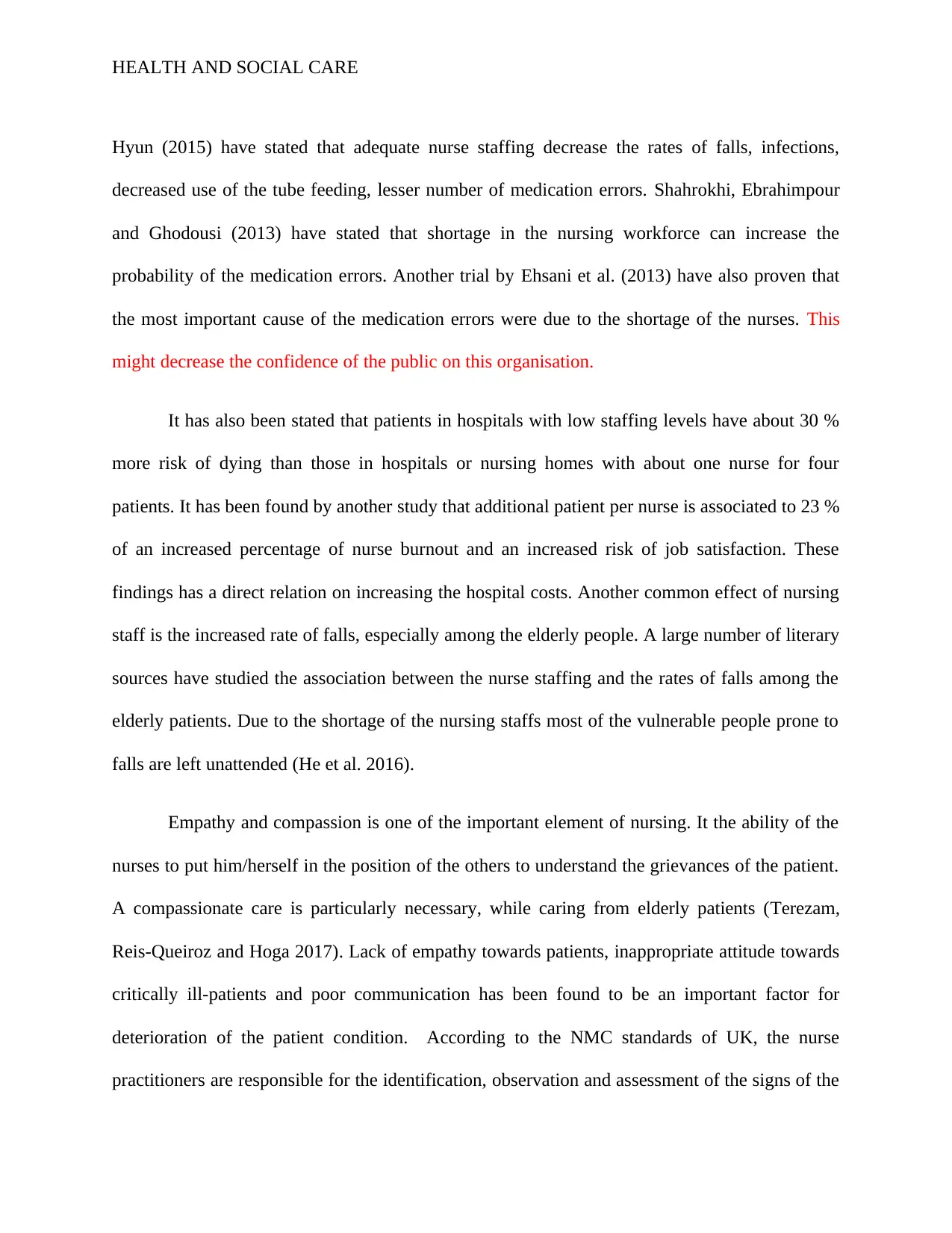
HEALTH AND SOCIAL CARE
Hyun (2015) have stated that adequate nurse staffing decrease the rates of falls, infections,
decreased use of the tube feeding, lesser number of medication errors. Shahrokhi, Ebrahimpour
and Ghodousi (2013) have stated that shortage in the nursing workforce can increase the
probability of the medication errors. Another trial by Ehsani et al. (2013) have also proven that
the most important cause of the medication errors were due to the shortage of the nurses. This
might decrease the confidence of the public on this organisation.
It has also been stated that patients in hospitals with low staffing levels have about 30 %
more risk of dying than those in hospitals or nursing homes with about one nurse for four
patients. It has been found by another study that additional patient per nurse is associated to 23 %
of an increased percentage of nurse burnout and an increased risk of job satisfaction. These
findings has a direct relation on increasing the hospital costs. Another common effect of nursing
staff is the increased rate of falls, especially among the elderly people. A large number of literary
sources have studied the association between the nurse staffing and the rates of falls among the
elderly patients. Due to the shortage of the nursing staffs most of the vulnerable people prone to
falls are left unattended (He et al. 2016).
Empathy and compassion is one of the important element of nursing. It the ability of the
nurses to put him/herself in the position of the others to understand the grievances of the patient.
A compassionate care is particularly necessary, while caring from elderly patients (Terezam,
Reis-Queiroz and Hoga 2017). Lack of empathy towards patients, inappropriate attitude towards
critically ill-patients and poor communication has been found to be an important factor for
deterioration of the patient condition. According to the NMC standards of UK, the nurse
practitioners are responsible for the identification, observation and assessment of the signs of the
Hyun (2015) have stated that adequate nurse staffing decrease the rates of falls, infections,
decreased use of the tube feeding, lesser number of medication errors. Shahrokhi, Ebrahimpour
and Ghodousi (2013) have stated that shortage in the nursing workforce can increase the
probability of the medication errors. Another trial by Ehsani et al. (2013) have also proven that
the most important cause of the medication errors were due to the shortage of the nurses. This
might decrease the confidence of the public on this organisation.
It has also been stated that patients in hospitals with low staffing levels have about 30 %
more risk of dying than those in hospitals or nursing homes with about one nurse for four
patients. It has been found by another study that additional patient per nurse is associated to 23 %
of an increased percentage of nurse burnout and an increased risk of job satisfaction. These
findings has a direct relation on increasing the hospital costs. Another common effect of nursing
staff is the increased rate of falls, especially among the elderly people. A large number of literary
sources have studied the association between the nurse staffing and the rates of falls among the
elderly patients. Due to the shortage of the nursing staffs most of the vulnerable people prone to
falls are left unattended (He et al. 2016).
Empathy and compassion is one of the important element of nursing. It the ability of the
nurses to put him/herself in the position of the others to understand the grievances of the patient.
A compassionate care is particularly necessary, while caring from elderly patients (Terezam,
Reis-Queiroz and Hoga 2017). Lack of empathy towards patients, inappropriate attitude towards
critically ill-patients and poor communication has been found to be an important factor for
deterioration of the patient condition. According to the NMC standards of UK, the nurse
practitioners are responsible for the identification, observation and assessment of the signs of the
⊘ This is a preview!⊘
Do you want full access?
Subscribe today to unlock all pages.

Trusted by 1+ million students worldwide
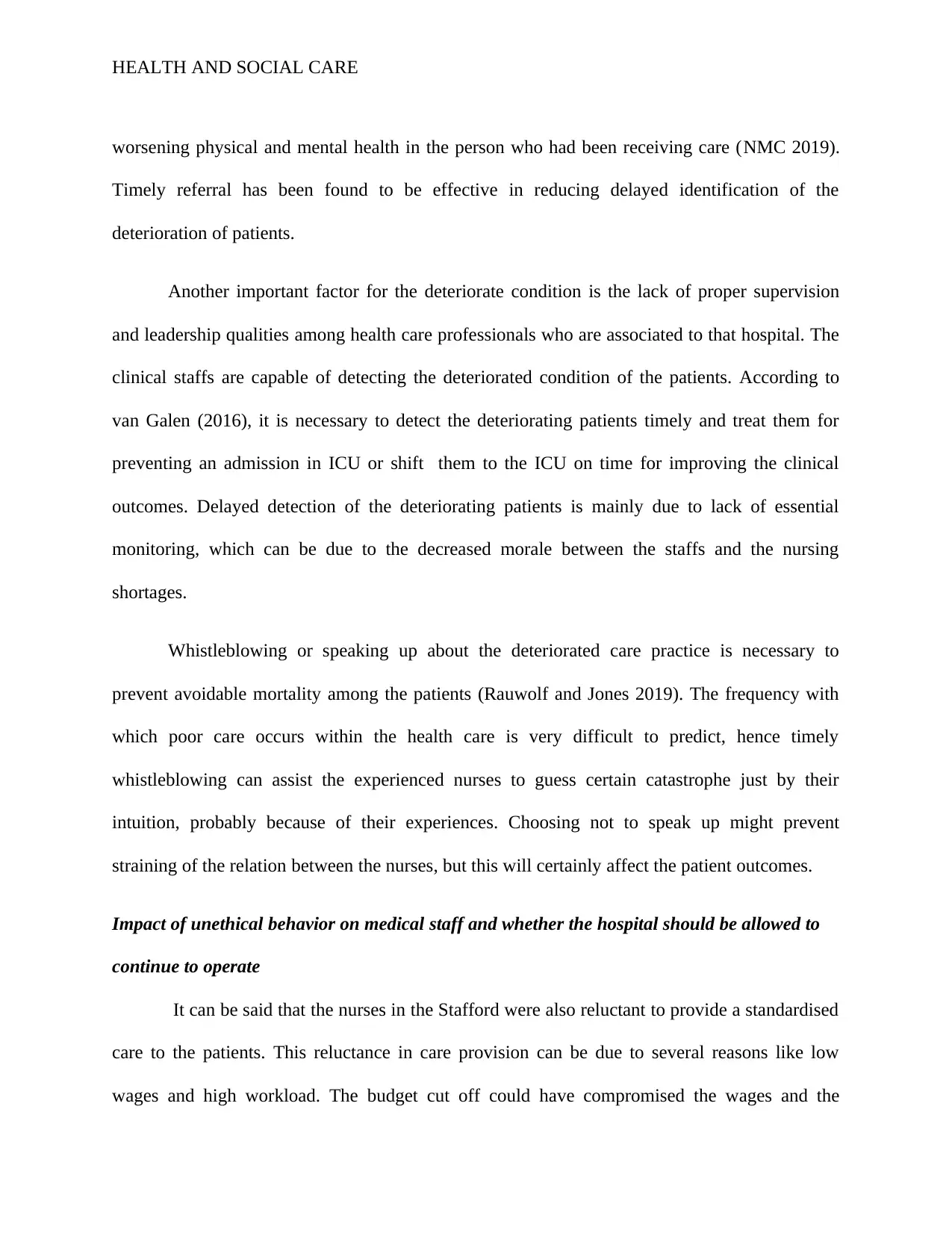
HEALTH AND SOCIAL CARE
worsening physical and mental health in the person who had been receiving care (NMC 2019).
Timely referral has been found to be effective in reducing delayed identification of the
deterioration of patients.
Another important factor for the deteriorate condition is the lack of proper supervision
and leadership qualities among health care professionals who are associated to that hospital. The
clinical staffs are capable of detecting the deteriorated condition of the patients. According to
van Galen (2016), it is necessary to detect the deteriorating patients timely and treat them for
preventing an admission in ICU or shift them to the ICU on time for improving the clinical
outcomes. Delayed detection of the deteriorating patients is mainly due to lack of essential
monitoring, which can be due to the decreased morale between the staffs and the nursing
shortages.
Whistleblowing or speaking up about the deteriorated care practice is necessary to
prevent avoidable mortality among the patients (Rauwolf and Jones 2019). The frequency with
which poor care occurs within the health care is very difficult to predict, hence timely
whistleblowing can assist the experienced nurses to guess certain catastrophe just by their
intuition, probably because of their experiences. Choosing not to speak up might prevent
straining of the relation between the nurses, but this will certainly affect the patient outcomes.
Impact of unethical behavior on medical staff and whether the hospital should be allowed to
continue to operate
It can be said that the nurses in the Stafford were also reluctant to provide a standardised
care to the patients. This reluctance in care provision can be due to several reasons like low
wages and high workload. The budget cut off could have compromised the wages and the
worsening physical and mental health in the person who had been receiving care (NMC 2019).
Timely referral has been found to be effective in reducing delayed identification of the
deterioration of patients.
Another important factor for the deteriorate condition is the lack of proper supervision
and leadership qualities among health care professionals who are associated to that hospital. The
clinical staffs are capable of detecting the deteriorated condition of the patients. According to
van Galen (2016), it is necessary to detect the deteriorating patients timely and treat them for
preventing an admission in ICU or shift them to the ICU on time for improving the clinical
outcomes. Delayed detection of the deteriorating patients is mainly due to lack of essential
monitoring, which can be due to the decreased morale between the staffs and the nursing
shortages.
Whistleblowing or speaking up about the deteriorated care practice is necessary to
prevent avoidable mortality among the patients (Rauwolf and Jones 2019). The frequency with
which poor care occurs within the health care is very difficult to predict, hence timely
whistleblowing can assist the experienced nurses to guess certain catastrophe just by their
intuition, probably because of their experiences. Choosing not to speak up might prevent
straining of the relation between the nurses, but this will certainly affect the patient outcomes.
Impact of unethical behavior on medical staff and whether the hospital should be allowed to
continue to operate
It can be said that the nurses in the Stafford were also reluctant to provide a standardised
care to the patients. This reluctance in care provision can be due to several reasons like low
wages and high workload. The budget cut off could have compromised the wages and the
Paraphrase This Document
Need a fresh take? Get an instant paraphrase of this document with our AI Paraphraser
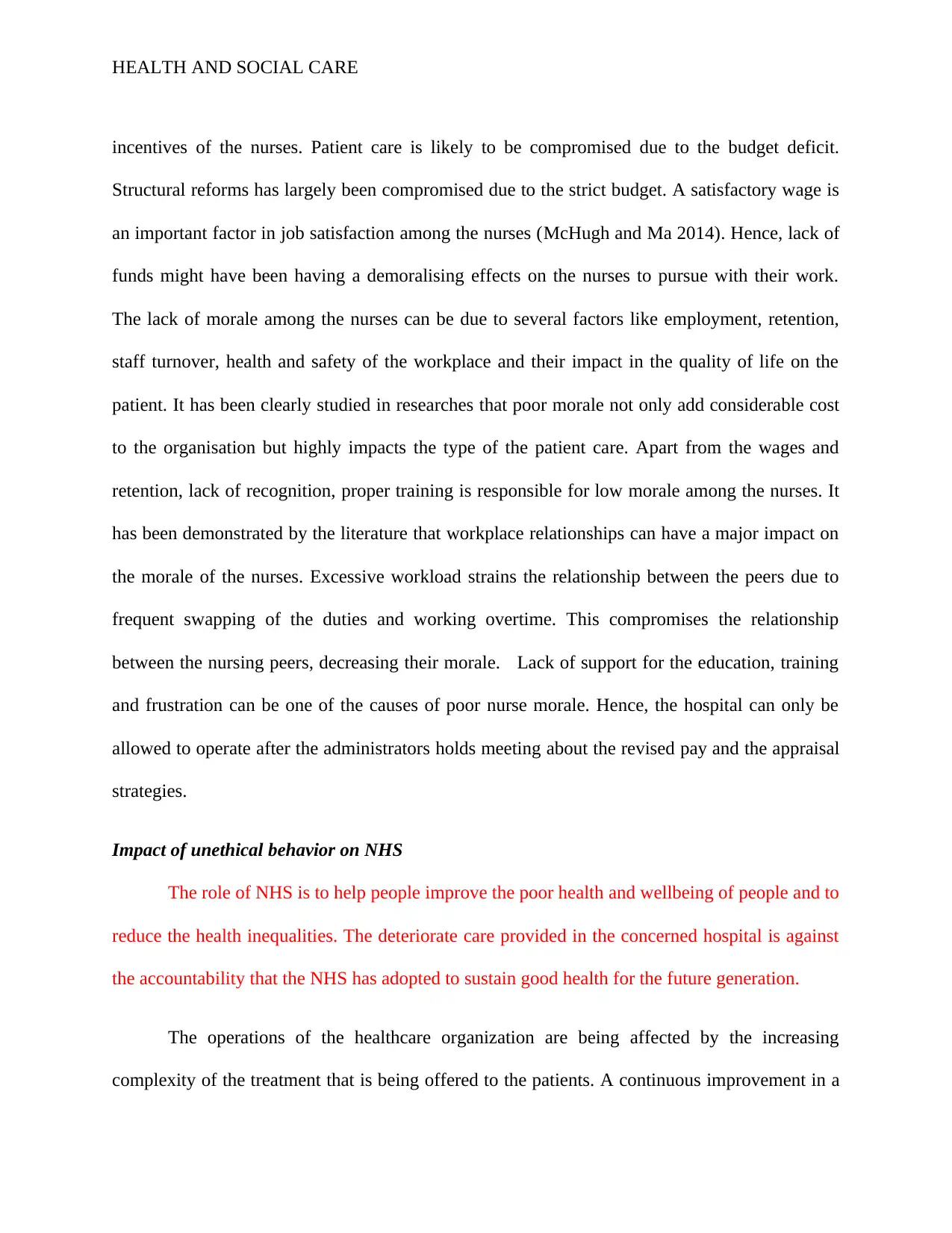
HEALTH AND SOCIAL CARE
incentives of the nurses. Patient care is likely to be compromised due to the budget deficit.
Structural reforms has largely been compromised due to the strict budget. A satisfactory wage is
an important factor in job satisfaction among the nurses (McHugh and Ma 2014). Hence, lack of
funds might have been having a demoralising effects on the nurses to pursue with their work.
The lack of morale among the nurses can be due to several factors like employment, retention,
staff turnover, health and safety of the workplace and their impact in the quality of life on the
patient. It has been clearly studied in researches that poor morale not only add considerable cost
to the organisation but highly impacts the type of the patient care. Apart from the wages and
retention, lack of recognition, proper training is responsible for low morale among the nurses. It
has been demonstrated by the literature that workplace relationships can have a major impact on
the morale of the nurses. Excessive workload strains the relationship between the peers due to
frequent swapping of the duties and working overtime. This compromises the relationship
between the nursing peers, decreasing their morale. Lack of support for the education, training
and frustration can be one of the causes of poor nurse morale. Hence, the hospital can only be
allowed to operate after the administrators holds meeting about the revised pay and the appraisal
strategies.
Impact of unethical behavior on NHS
The role of NHS is to help people improve the poor health and wellbeing of people and to
reduce the health inequalities. The deteriorate care provided in the concerned hospital is against
the accountability that the NHS has adopted to sustain good health for the future generation.
The operations of the healthcare organization are being affected by the increasing
complexity of the treatment that is being offered to the patients. A continuous improvement in a
incentives of the nurses. Patient care is likely to be compromised due to the budget deficit.
Structural reforms has largely been compromised due to the strict budget. A satisfactory wage is
an important factor in job satisfaction among the nurses (McHugh and Ma 2014). Hence, lack of
funds might have been having a demoralising effects on the nurses to pursue with their work.
The lack of morale among the nurses can be due to several factors like employment, retention,
staff turnover, health and safety of the workplace and their impact in the quality of life on the
patient. It has been clearly studied in researches that poor morale not only add considerable cost
to the organisation but highly impacts the type of the patient care. Apart from the wages and
retention, lack of recognition, proper training is responsible for low morale among the nurses. It
has been demonstrated by the literature that workplace relationships can have a major impact on
the morale of the nurses. Excessive workload strains the relationship between the peers due to
frequent swapping of the duties and working overtime. This compromises the relationship
between the nursing peers, decreasing their morale. Lack of support for the education, training
and frustration can be one of the causes of poor nurse morale. Hence, the hospital can only be
allowed to operate after the administrators holds meeting about the revised pay and the appraisal
strategies.
Impact of unethical behavior on NHS
The role of NHS is to help people improve the poor health and wellbeing of people and to
reduce the health inequalities. The deteriorate care provided in the concerned hospital is against
the accountability that the NHS has adopted to sustain good health for the future generation.
The operations of the healthcare organization are being affected by the increasing
complexity of the treatment that is being offered to the patients. A continuous improvement in a
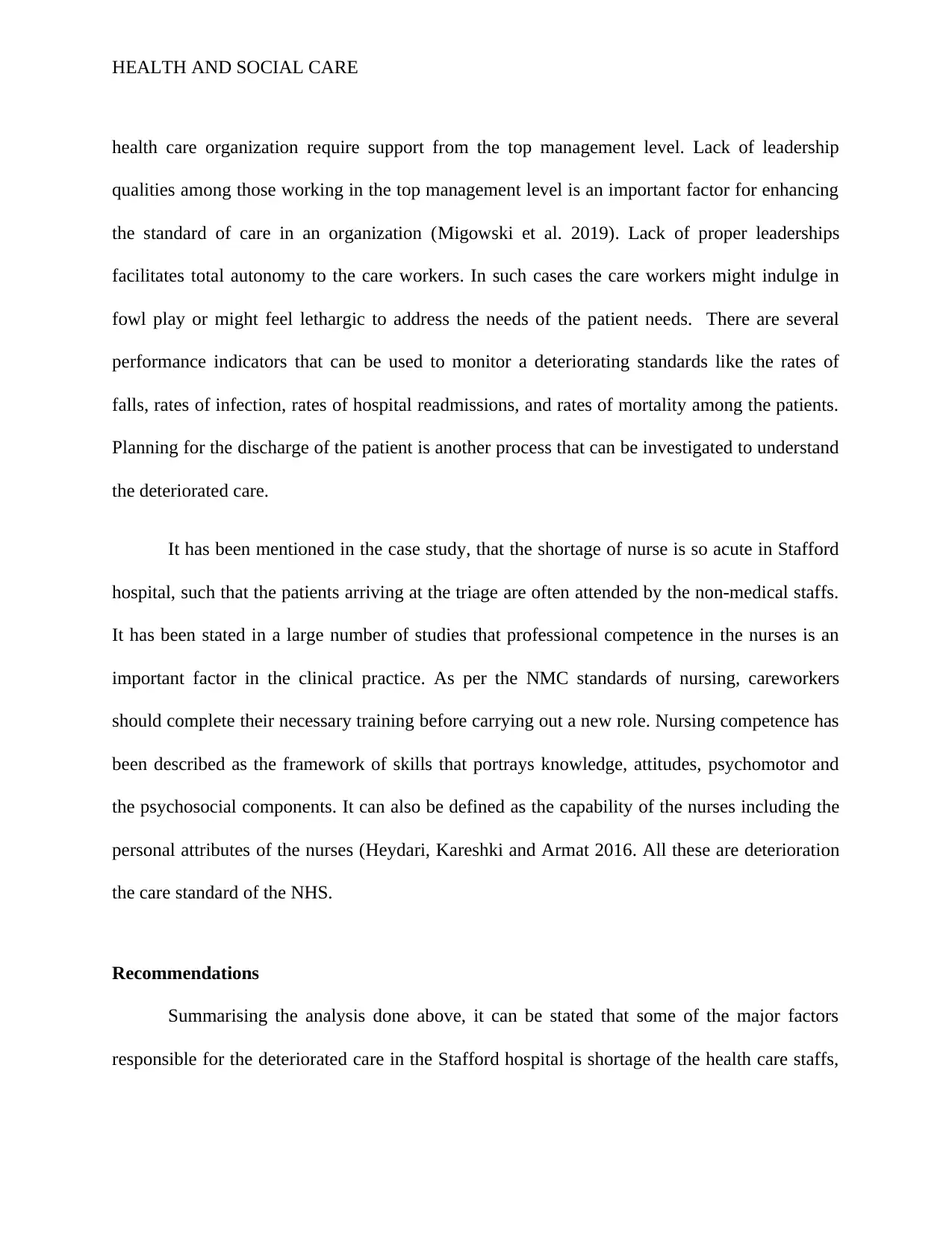
HEALTH AND SOCIAL CARE
health care organization require support from the top management level. Lack of leadership
qualities among those working in the top management level is an important factor for enhancing
the standard of care in an organization (Migowski et al. 2019). Lack of proper leaderships
facilitates total autonomy to the care workers. In such cases the care workers might indulge in
fowl play or might feel lethargic to address the needs of the patient needs. There are several
performance indicators that can be used to monitor a deteriorating standards like the rates of
falls, rates of infection, rates of hospital readmissions, and rates of mortality among the patients.
Planning for the discharge of the patient is another process that can be investigated to understand
the deteriorated care.
It has been mentioned in the case study, that the shortage of nurse is so acute in Stafford
hospital, such that the patients arriving at the triage are often attended by the non-medical staffs.
It has been stated in a large number of studies that professional competence in the nurses is an
important factor in the clinical practice. As per the NMC standards of nursing, careworkers
should complete their necessary training before carrying out a new role. Nursing competence has
been described as the framework of skills that portrays knowledge, attitudes, psychomotor and
the psychosocial components. It can also be defined as the capability of the nurses including the
personal attributes of the nurses (Heydari, Kareshki and Armat 2016. All these are deterioration
the care standard of the NHS.
Recommendations
Summarising the analysis done above, it can be stated that some of the major factors
responsible for the deteriorated care in the Stafford hospital is shortage of the health care staffs,
health care organization require support from the top management level. Lack of leadership
qualities among those working in the top management level is an important factor for enhancing
the standard of care in an organization (Migowski et al. 2019). Lack of proper leaderships
facilitates total autonomy to the care workers. In such cases the care workers might indulge in
fowl play or might feel lethargic to address the needs of the patient needs. There are several
performance indicators that can be used to monitor a deteriorating standards like the rates of
falls, rates of infection, rates of hospital readmissions, and rates of mortality among the patients.
Planning for the discharge of the patient is another process that can be investigated to understand
the deteriorated care.
It has been mentioned in the case study, that the shortage of nurse is so acute in Stafford
hospital, such that the patients arriving at the triage are often attended by the non-medical staffs.
It has been stated in a large number of studies that professional competence in the nurses is an
important factor in the clinical practice. As per the NMC standards of nursing, careworkers
should complete their necessary training before carrying out a new role. Nursing competence has
been described as the framework of skills that portrays knowledge, attitudes, psychomotor and
the psychosocial components. It can also be defined as the capability of the nurses including the
personal attributes of the nurses (Heydari, Kareshki and Armat 2016. All these are deterioration
the care standard of the NHS.
Recommendations
Summarising the analysis done above, it can be stated that some of the major factors
responsible for the deteriorated care in the Stafford hospital is shortage of the health care staffs,
⊘ This is a preview!⊘
Do you want full access?
Subscribe today to unlock all pages.

Trusted by 1+ million students worldwide
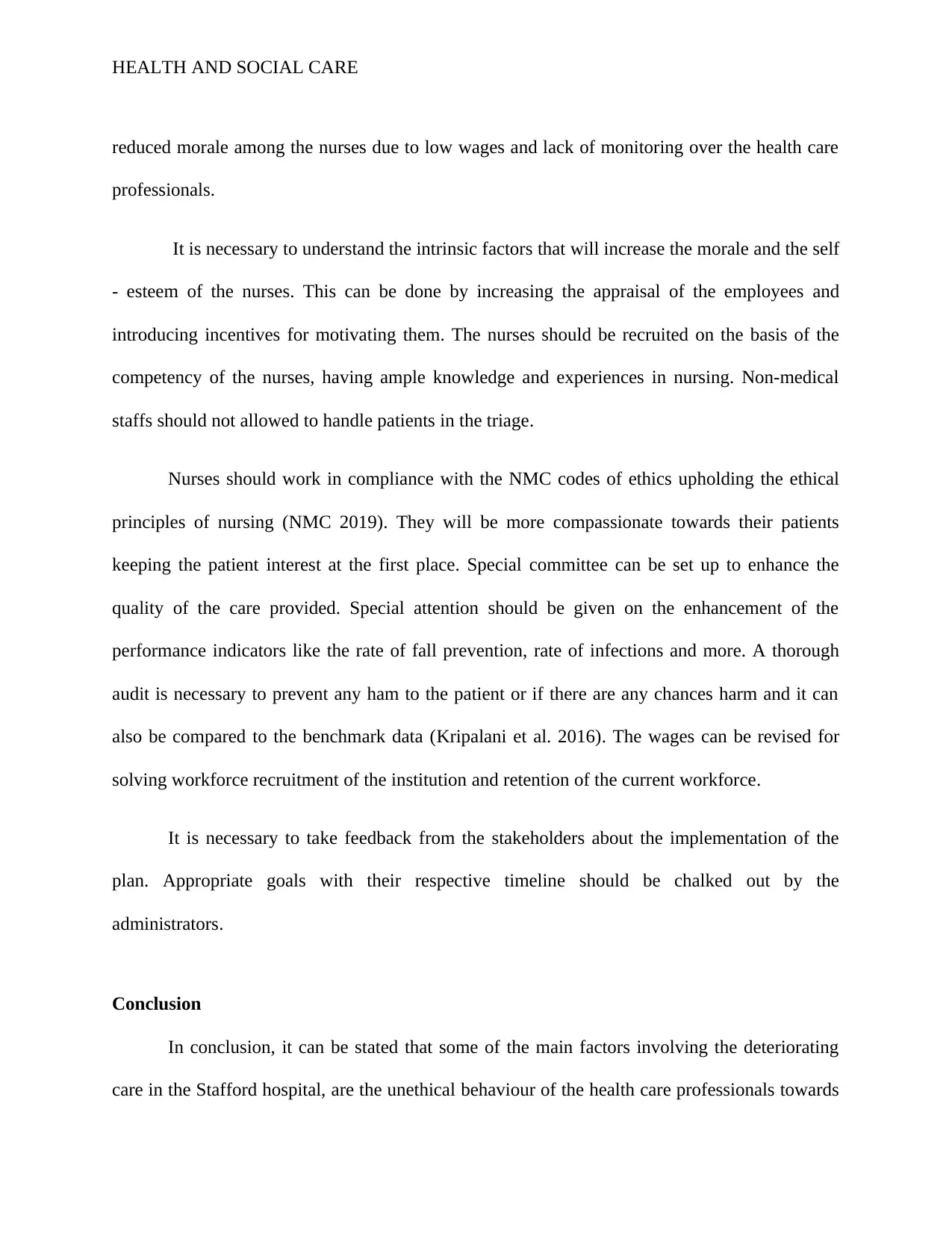
HEALTH AND SOCIAL CARE
reduced morale among the nurses due to low wages and lack of monitoring over the health care
professionals.
It is necessary to understand the intrinsic factors that will increase the morale and the self
- esteem of the nurses. This can be done by increasing the appraisal of the employees and
introducing incentives for motivating them. The nurses should be recruited on the basis of the
competency of the nurses, having ample knowledge and experiences in nursing. Non-medical
staffs should not allowed to handle patients in the triage.
Nurses should work in compliance with the NMC codes of ethics upholding the ethical
principles of nursing (NMC 2019). They will be more compassionate towards their patients
keeping the patient interest at the first place. Special committee can be set up to enhance the
quality of the care provided. Special attention should be given on the enhancement of the
performance indicators like the rate of fall prevention, rate of infections and more. A thorough
audit is necessary to prevent any ham to the patient or if there are any chances harm and it can
also be compared to the benchmark data (Kripalani et al. 2016). The wages can be revised for
solving workforce recruitment of the institution and retention of the current workforce.
It is necessary to take feedback from the stakeholders about the implementation of the
plan. Appropriate goals with their respective timeline should be chalked out by the
administrators.
Conclusion
In conclusion, it can be stated that some of the main factors involving the deteriorating
care in the Stafford hospital, are the unethical behaviour of the health care professionals towards
reduced morale among the nurses due to low wages and lack of monitoring over the health care
professionals.
It is necessary to understand the intrinsic factors that will increase the morale and the self
- esteem of the nurses. This can be done by increasing the appraisal of the employees and
introducing incentives for motivating them. The nurses should be recruited on the basis of the
competency of the nurses, having ample knowledge and experiences in nursing. Non-medical
staffs should not allowed to handle patients in the triage.
Nurses should work in compliance with the NMC codes of ethics upholding the ethical
principles of nursing (NMC 2019). They will be more compassionate towards their patients
keeping the patient interest at the first place. Special committee can be set up to enhance the
quality of the care provided. Special attention should be given on the enhancement of the
performance indicators like the rate of fall prevention, rate of infections and more. A thorough
audit is necessary to prevent any ham to the patient or if there are any chances harm and it can
also be compared to the benchmark data (Kripalani et al. 2016). The wages can be revised for
solving workforce recruitment of the institution and retention of the current workforce.
It is necessary to take feedback from the stakeholders about the implementation of the
plan. Appropriate goals with their respective timeline should be chalked out by the
administrators.
Conclusion
In conclusion, it can be stated that some of the main factors involving the deteriorating
care in the Stafford hospital, are the unethical behaviour of the health care professionals towards
Paraphrase This Document
Need a fresh take? Get an instant paraphrase of this document with our AI Paraphraser
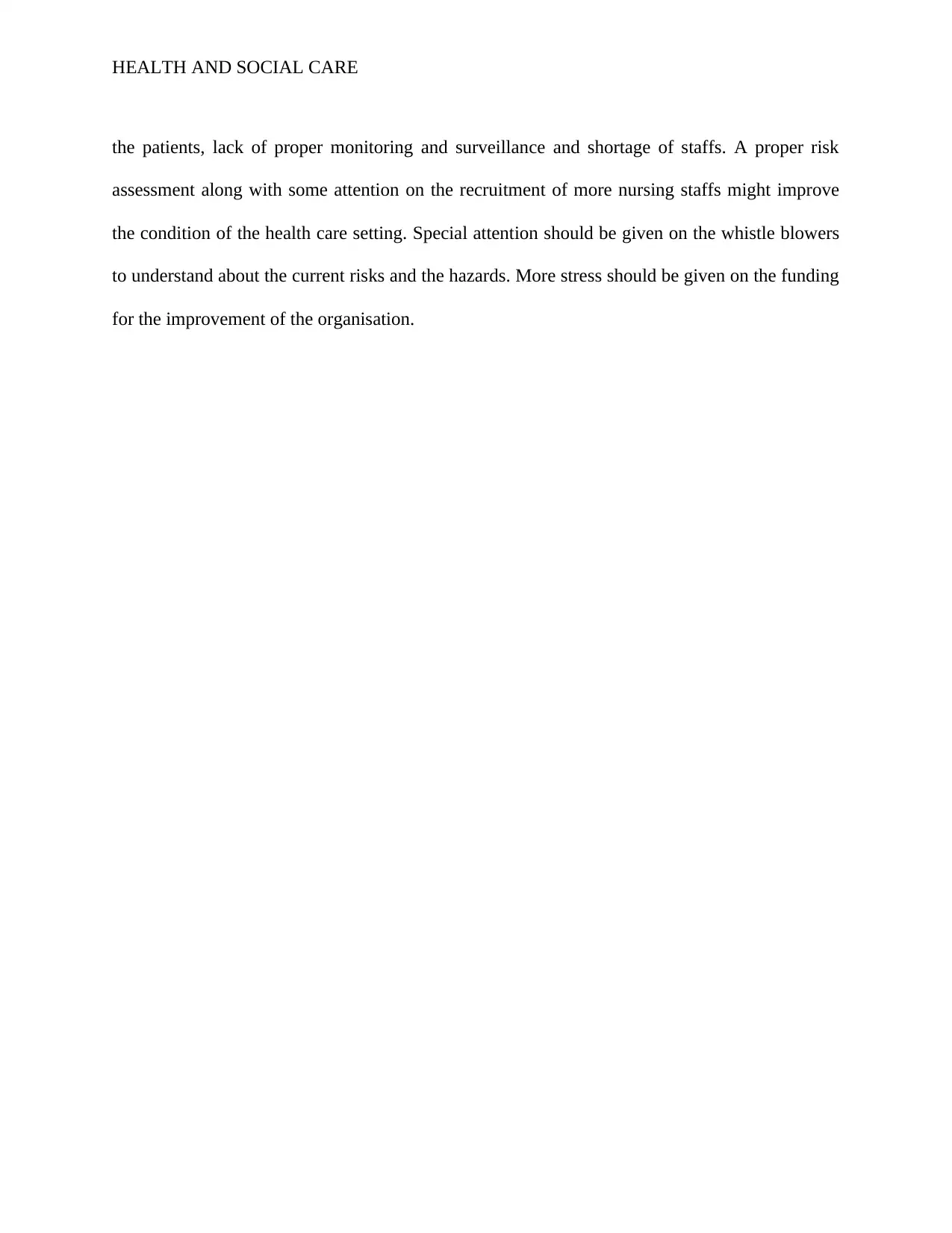
HEALTH AND SOCIAL CARE
the patients, lack of proper monitoring and surveillance and shortage of staffs. A proper risk
assessment along with some attention on the recruitment of more nursing staffs might improve
the condition of the health care setting. Special attention should be given on the whistle blowers
to understand about the current risks and the hazards. More stress should be given on the funding
for the improvement of the organisation.
the patients, lack of proper monitoring and surveillance and shortage of staffs. A proper risk
assessment along with some attention on the recruitment of more nursing staffs might improve
the condition of the health care setting. Special attention should be given on the whistle blowers
to understand about the current risks and the hazards. More stress should be given on the funding
for the improvement of the organisation.
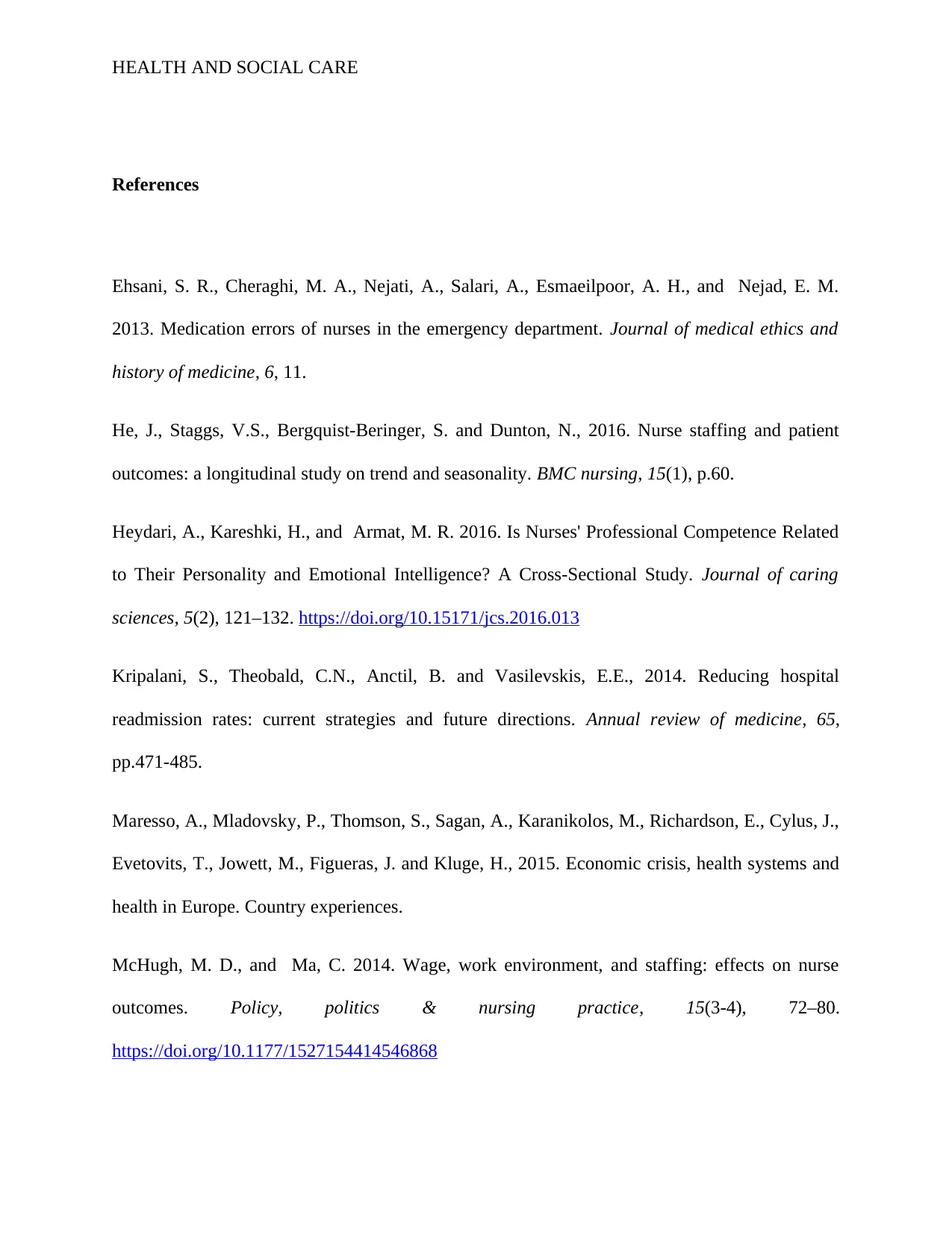
HEALTH AND SOCIAL CARE
References
Ehsani, S. R., Cheraghi, M. A., Nejati, A., Salari, A., Esmaeilpoor, A. H., and Nejad, E. M.
2013. Medication errors of nurses in the emergency department. Journal of medical ethics and
history of medicine, 6, 11.
He, J., Staggs, V.S., Bergquist-Beringer, S. and Dunton, N., 2016. Nurse staffing and patient
outcomes: a longitudinal study on trend and seasonality. BMC nursing, 15(1), p.60.
Heydari, A., Kareshki, H., and Armat, M. R. 2016. Is Nurses' Professional Competence Related
to Their Personality and Emotional Intelligence? A Cross-Sectional Study. Journal of caring
sciences, 5(2), 121–132. https://doi.org/10.15171/jcs.2016.013
Kripalani, S., Theobald, C.N., Anctil, B. and Vasilevskis, E.E., 2014. Reducing hospital
readmission rates: current strategies and future directions. Annual review of medicine, 65,
pp.471-485.
Maresso, A., Mladovsky, P., Thomson, S., Sagan, A., Karanikolos, M., Richardson, E., Cylus, J.,
Evetovits, T., Jowett, M., Figueras, J. and Kluge, H., 2015. Economic crisis, health systems and
health in Europe. Country experiences.
McHugh, M. D., and Ma, C. 2014. Wage, work environment, and staffing: effects on nurse
outcomes. Policy, politics & nursing practice, 15(3-4), 72–80.
https://doi.org/10.1177/1527154414546868
References
Ehsani, S. R., Cheraghi, M. A., Nejati, A., Salari, A., Esmaeilpoor, A. H., and Nejad, E. M.
2013. Medication errors of nurses in the emergency department. Journal of medical ethics and
history of medicine, 6, 11.
He, J., Staggs, V.S., Bergquist-Beringer, S. and Dunton, N., 2016. Nurse staffing and patient
outcomes: a longitudinal study on trend and seasonality. BMC nursing, 15(1), p.60.
Heydari, A., Kareshki, H., and Armat, M. R. 2016. Is Nurses' Professional Competence Related
to Their Personality and Emotional Intelligence? A Cross-Sectional Study. Journal of caring
sciences, 5(2), 121–132. https://doi.org/10.15171/jcs.2016.013
Kripalani, S., Theobald, C.N., Anctil, B. and Vasilevskis, E.E., 2014. Reducing hospital
readmission rates: current strategies and future directions. Annual review of medicine, 65,
pp.471-485.
Maresso, A., Mladovsky, P., Thomson, S., Sagan, A., Karanikolos, M., Richardson, E., Cylus, J.,
Evetovits, T., Jowett, M., Figueras, J. and Kluge, H., 2015. Economic crisis, health systems and
health in Europe. Country experiences.
McHugh, M. D., and Ma, C. 2014. Wage, work environment, and staffing: effects on nurse
outcomes. Policy, politics & nursing practice, 15(3-4), 72–80.
https://doi.org/10.1177/1527154414546868
⊘ This is a preview!⊘
Do you want full access?
Subscribe today to unlock all pages.

Trusted by 1+ million students worldwide
1 out of 14
Related Documents
Your All-in-One AI-Powered Toolkit for Academic Success.
+13062052269
info@desklib.com
Available 24*7 on WhatsApp / Email
![[object Object]](/_next/static/media/star-bottom.7253800d.svg)
Unlock your academic potential
Copyright © 2020–2026 A2Z Services. All Rights Reserved. Developed and managed by ZUCOL.





